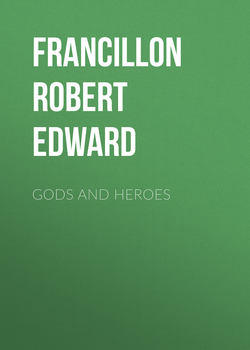Читать книгу Gods and Heroes - Francillon Robert Edward - Страница 6
APOLLO
PART I. – THE STORIES OF LATONA AND NIOBE
ОглавлениеJUPITER once fell in love with a beautiful Titaness named Latona. This made Juno terribly angry: so she sent a huge and horrible snake, called Python, to hunt Latona all over the world. And she went to Terra, and made her swear not to give Latona a resting-place or a hiding-place anywhere.
So poor Latona was hunted and driven about by Python night and day. She also went to our Grandmother Earth, and begged for a corner to rest in or a cave to hide in. But old Terra said, “No. I have sworn to Juno that you shall have no rest in me.”
At last, in her despair, she went to Neptune, and prayed him to hide her in his waters, since Earth had refused her. Neptune said, “I wish I could, with all my heart; but what place is there, in the sea or on the land, where you can hide from the Queen of the Sky? But wait – there’s one thing that nobody knows of but me. There is an island under the sea; and this island is always moving and wandering about, so that nobody can see it, or tell where it may chance to be, for it is never in the same place two minutes together. It isn’t sea, because its land; but it doesn’t belong to Terra, because it’s under the sea, and has no bottom. I’ll tell you what I’ll do for you. I’ll fix it where nobody can find it, and you’ll be safe there, because it’s neither earth nor sea.”
So Neptune anchored the floating island in a part of the Ægean Sea. The island is called Delos; and it is there still, just where it was fixed by Neptune for Latona.
Latona went and lived there, safe from Juno and Python. After a time she had two children, a son and a daughter. The son was named Apollo, and the daughter Diana.
Both were beautiful, but Apollo was the most beautiful boy ever born. He was a wonderful child in every way. The very instant he was born he made a bow and arrow, and went across the sea, and found Python, and killed him. When he was four years old, he built one of the wonders of the world – a great altar to the gods, made of the horns of the goats that his sister Diana used to hunt and shoot in the mountains. With two such children to help her, Latona no longer felt afraid of Juno. So she left Delos, and came, with her two children, into a country of Asia Minor, called Lydia.
Now there was a princess in Thebes named Niobe, who had fourteen beautiful children – seven daughters and seven sons. She was very fond and proud of them, and she did not like to hear people talking about Latona’s wonderful children. “What signifies a miserable couple of children, when I have fourteen?” she used to say. “I don’t think much of Latona”; and, in her jealousy, she never lost a chance of insulting the mother of Apollo and Diana.
Of course these insults came to Latona’s ears. Apollo and Diana heard of them too; and they resolved to punish the proud princess who insulted and scorned their mother. I scarcely like to tell you of how they punished Niobe, for I cannot think of anything more cruel.
Each of them took a bow and seven arrows. Apollo shot with his arrows all the seven sons of Niobe. Diana shot six of Niobe’s seven daughters, leaving only one alive. “There!” said they; “what signifies a miserable one child, when our mother has two?”
When poor Niobe saw her children killed before her she wept bitterly, and she could not stop her tears. They flowed on and on, until she cried herself into stone.
As for Apollo, he kept on growing handsomer and stronger until he became a god – the most glorious of all the gods in the sky. Jupiter made him the god of the Sun, and made his sister, Diana, goddess of the Moon. He was also the god of all beautiful and useful things: of music, painting, poetry, medicine. Several names were given to him. One of his names is “Phœbus,” which means bright and splendid like the sun. “Apollo” means “the Destroyer”: people must guess for themselves why he was called “the Destroyer.”
In pictures and statues he is always made graceful, beautiful, and young. He has no hair on his face, but wears long waving hair. Sometimes he carries a lyre – a sort of small harp – and sometimes a bow. Very often he wears a wreath of laurel. You must take a great deal of notice of Apollo, or Phœbus, because he is the most famous of all the gods next to Jupiter. It will help you to know him if you think of him as always beautiful, wise, and bright, but rather cruel and hard.
